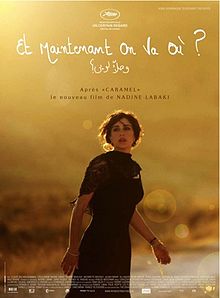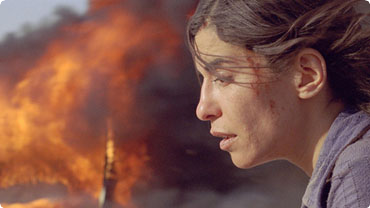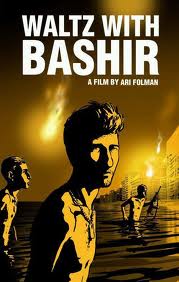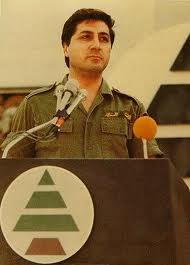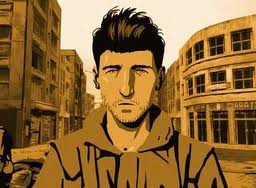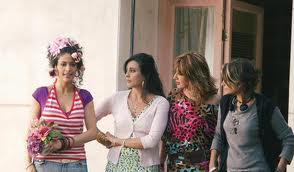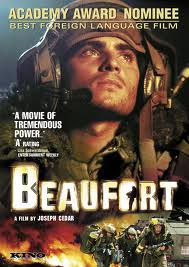 We all know of a country named Israel, and we are also aware of what the Nazis led by Hitler did to Jews in World War II, but it is a little hard for Japanese people to understand the complexity of what kind of country Israel is today, what is happening in Israel, and what kind of relationship Israel has with their neighbors—the Palestinian National Authority, Egypt, Jordan, Lebanon, and Syria. Therefore, when Japanese people watch this movie, it is difficult to understand what young Israeli soldiers are doing in Beaufort castle in south Lebanon. Although the Israeli soldiers do not attack anyone in this movie, missiles soar incessantly from somewhere and young soldiers die one after another.
We all know of a country named Israel, and we are also aware of what the Nazis led by Hitler did to Jews in World War II, but it is a little hard for Japanese people to understand the complexity of what kind of country Israel is today, what is happening in Israel, and what kind of relationship Israel has with their neighbors—the Palestinian National Authority, Egypt, Jordan, Lebanon, and Syria. Therefore, when Japanese people watch this movie, it is difficult to understand what young Israeli soldiers are doing in Beaufort castle in south Lebanon. Although the Israeli soldiers do not attack anyone in this movie, missiles soar incessantly from somewhere and young soldiers die one after another.
The movie is set in 2000, but this movie is difficult to understand unless you look at the background leading up to it. Since the outbreak of the Arab-Israeli War, Jordan actively accepted the Palestinian refugees driven from Israel; but after the Six-Day War, they changed their direction and expelled Palestinian refugees from Jordan in order to maintain a more neutral alignment. These Palestinian immigrants moved to Lebanon and brought about great chaos in Lebanese politics which had been under a delicate balance between Christians and Muslims; after this, Syria became more influential over Lebanon.
In 1982, with one border secured with the peace agreement between Egypt and Israel that was mediated by the Carter administration, Israel suddenly invaded a chaotic Lebanon and besieged Lebanon’s capital, Beirut. The true intentions were to remove Syria and other Arab influence from Lebanon, convert Lebanon into a pro-Israel nation, and keep Bashir Gemayel—a charismatic, pro-Israel, anti-Syria, young Lebanese leader—in power in Lebanon’s government. Bashir was elected as president in the August 1982 elections, but was assassinated in the following September. Lebanon plunged deeper into civil war as a result of this. Beaufort is a historic castle that was built by the Crusaders in the 12th century and Israel took control of this castle during this fierce battle.
In response to the invasion of the Israel army, a military association called Hezbollah was formed in Lebanon. It was a radical Shia Islamic organization and its main objectives were to found an Iranian-style Islamic Republic in Lebanon and remove non-Islamic influence in that area. It took an anti-Western stance and supported the Israeli extermination; it is said that Iran and Syria supported this. On the other hand, Sunni nations such as Saudi Arabia, Jordan, and Egypt criticized the actions of Hezbollah. Since the 1980s, Hezbollah has attacked facilities associated with the West and Israel that were both within and outside of Lebanon including the suicide bombing on the American Marine Corps barracks in Beirut in 1983, the suicide bombing of the American Embassy in Beirut in 1984, and attacking the Israel Embassy in Argentina in 1992. In the movie, the Hezbollah attacks the Israel army in Beaufort with missiles from a distance.
During the Cold War, America supported Israel and adopted the strategy to make Israel the center of anti-Soviet Union politics within the Arab region, but since 1990, the world situation changed and Iraq became a threat to America. In return for Syria dispatching troops for the Gulf War, America allowed Syria to settle the civil war in Lebanon in Syria’s favor. Thus, Israel’s invasion of Lebanon did not result in what Israel envisioned and, under criticism from the whole world, they proceeded to withdraw from Lebanon. In 2000, Beaufort functioned as the only base and lookout point for Israel in Lebanon, but the Israeli government finally decided to withdraw troops from there.
 This movie focuses on the Israeli soldiers who were sent here just after being drafted as teenagers and didn’t understand the international dynamics; since Israel has decided to withdraw, a counterattack is not allowed, but even though the soldiers request to leave the fortress, the reply from headquarters is to just wait. Squad members die one after another while there is no superior officer to depend on. This movie depicts soldiers who have a pessimistic feeling about how their lives are being risked to protect the fortress that will soon be abandoned, are dissatisfied with the inexperienced leadership of the commanding officer who is also young, dream of returning to Israel and being reunited with their lovers, and, through it all, have mutual friendships and encourage each other.
This movie focuses on the Israeli soldiers who were sent here just after being drafted as teenagers and didn’t understand the international dynamics; since Israel has decided to withdraw, a counterattack is not allowed, but even though the soldiers request to leave the fortress, the reply from headquarters is to just wait. Squad members die one after another while there is no superior officer to depend on. This movie depicts soldiers who have a pessimistic feeling about how their lives are being risked to protect the fortress that will soon be abandoned, are dissatisfied with the inexperienced leadership of the commanding officer who is also young, dream of returning to Israel and being reunited with their lovers, and, through it all, have mutual friendships and encourage each other.
The undercurrent flowing through this movie is the question of, “What was the huge sacrifice of the attack of 1982 for?” With the world believing that the chaos in Lebanon was entirely because of Israel, Israel’s international standing worsened. No country wants to look back on their own past of violent acts that were criticized by other countries as historical mistakes. Hitler from Germany, Franco from Spain, the Dirty War in Argentina, and the Pacific War in Japan are a few examples. Even though these were historic disgraces, they happened and each country chose what they thought was the best option at that time. The Lebanon Civil War may have been a great mistake for Israel whose top priority has been to establish their home country. However, after watching this movie, I honestly hope that the people of Israel who have been struggling to maintain their nation under a complicated balance of power adopt the very best political measures in the future by learning from history.


